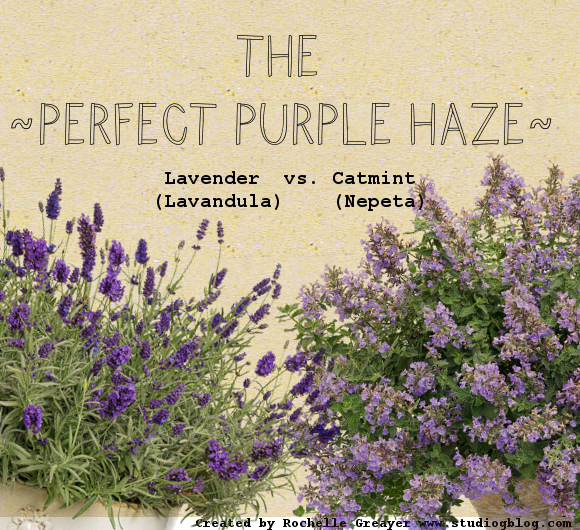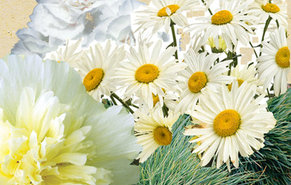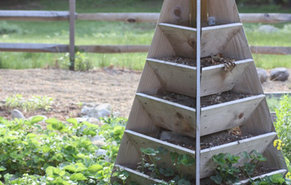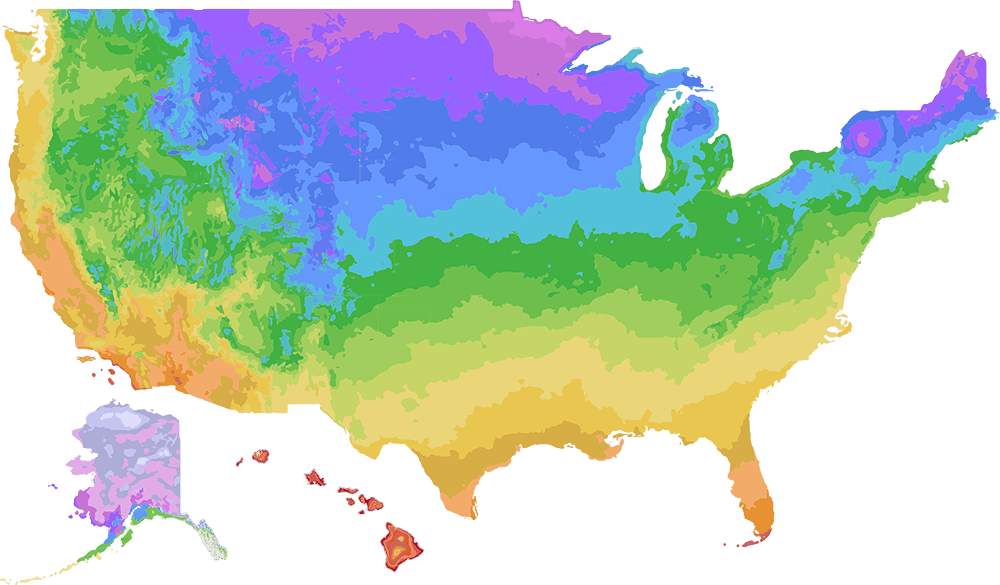Lavender or Catmint
Which Makes the Perfect Purple Edge?

Whether you have visited the south of France or just seen pictures you know how seductive those mounded purple rows of lavender can be. But the pictures don’t even tell half the story, the scent of lavender in the air on a hot day in July is simply the essence of summer.
I have a rather odd shaped driveway that makes a sharp right as you get to the top and make your way into the garage. The transition between the asphalt driveway and the gardens that greet me at the top of turn have always stumped me. It has a particular set of challenges as on one side there is the home of the annual snow plow dumping ground (which is on top of a perennial garden) and on the other there is a country version of a hell strip – the area between the asphalt and a rock retaining wall.
About 8 years ago I planted a lavender hedge on both sides – hoping to add the beauty and scent of the plant to my landscape. It sort of worked….until 2 years later the lavender on the snow mound side completely died over one winter. I lost 20 plants in one fell swoop. While I have never really (for sure) gotten to the bottom of why this happened, my suspicions lie in a winter snow melt that lasted too long and caused the plants to have wet feet for longer than they could tolerate.
But now that I had a one sided driveway (because I had no problem on the non-snow mound side) I needed a plan to bring back the glory of two sided purple haze. Fearing a repeat catastrophe, I opted to replaced the lavender with Catmint and left the (still happy) lavender on the hell strip side – and the plan is working!
Some in depth plant studying reveals why this plan worked:
- Lavender doesn’t like wet soil.
- Lavender also is evergreen and doesn’t die back (making it an easy target for the snowplow who piles it on)
- Lavender doesn’t like fertile soil (so the downhill side of the driveway, which has an edge that tends to be a trap for leaves and rotting debris, is not a great place)
Conversely -
- Catmint is much more tolerant of wetter soils.
- It also doesn’t mind a little fertilization every once in a while.
- And it dies back in the winter leaving nothing for the snow plow to catch and in dry winters nothing for the wind to whip.
But there are a few other things to consider here. I laid out this design about 9 years ago and since then, there have been substantial improvements in both Lavender and Catmint. Catmint used to have problems with maintaining its mounded shaped – often falling open in the middle and making it a less viable sub for lavender. Newer varieties, however, like Nepeta ‘Cat’s meow' and Cat's Pajamas’ doesn’t have this problem. Also, many lavenders that were on the market 9 years ago had a tendency to become woody and gnarly if not regularly pruned but improved varieties like Lavandula ‘Sweet Romance’ and others are less inclined to have this issue.
So if you are looking for the perfect purple haze which do you choose…catmint or lavender? In my case the answer is both.
-Rochelle
Images: courtesy of Proven Winners
Disclosure: This post is sponsored by Proven Winners. I am not an employee of Proven Winners and all opinions are my own.
See the other posts in this series.
Whether you have visited the south of France or just seen pictures you know how seductive those mounded purple rows of lavender can be. But the pictures don’t even tell half the story, the scent of lavender in the air on a hot day in July is simply the essence of summer.
I have a rather odd shaped driveway that makes a sharp right as you get to the top and make your way into the garage. The transition between the asphalt driveway and the gardens that greet me at the top of turn have always stumped me. It has a particular set of challenges as on one side there is the home of the annual snow plow dumping ground (which is on top of a perennial garden) and on the other there is a country version of a hell strip – the area between the asphalt and a rock retaining wall.
About 8 years ago I planted a lavender hedge on both sides – hoping to add the beauty and scent of the plant to my landscape. It sort of worked….until 2 years later the lavender on the snow mound side completely died over one winter. I lost 20 plants in one fell swoop. While I have never really (for sure) gotten to the bottom of why this happened, my suspicions lie in a winter snow melt that lasted too long and caused the plants to have wet feet for longer than they could tolerate.
But now that I had a one sided driveway (because I had no problem on the non-snow mound side) I needed a plan to bring back the glory of two sided purple haze. Fearing a repeat catastrophe, I opted to replaced the lavender with Catmint and left the (still happy) lavender on the hell strip side – and the plan is working!
Some in depth plant studying reveals why this plan worked:
- Lavender doesn’t like wet soil.
- Lavender also is evergreen and doesn’t die back (making it an easy target for the snowplow who piles it on)
- Lavender doesn’t like fertile soil (so the downhill side of the driveway, which has an edge that tends to be a trap for leaves and rotting debris, is not a great place)
Conversely -
- Catmint is much more tolerant of wetter soils.
- It also doesn’t mind a little fertilization every once in a while.
- And it dies back in the winter leaving nothing for the snow plow to catch and in dry winters nothing for the wind to whip.
But there are a few other things to consider here. I laid out this design about 9 years ago and since then, there have been substantial improvements in both Lavender and Catmint. Catmint used to have problems with maintaining its mounded shaped – often falling open in the middle and making it a less viable sub for lavender. Newer varieties, however, like Nepeta ‘Cat’s meow’ doesn’t have this problem. Also, many lavenders that were on the market 9 years ago had a tendency to become woody and gnarly if not regularly pruned but improved varieties like Lavandula ‘Sweet Romance’ and others are less inclined to have this issue.
So if you are looking for the perfect purple haze which do you choose…catmint or lavender?
In my case the answer is both.
-Rochelle
Images: courtesy of Proven winners
Disclosure: This post is sponsored by Proven Winners. I am not an employee of Proven Winners and all opinions are my own. See the other posts in this series.
- See more at: http://www.studiogblog.com/#sthash.FLNyjt2w.dpufWhether you have visited the south of France or just seen pictures you know how seductive those mounded purple rows of lavender can be. But the pictures don’t even tell half the story, the scent of lavender in the air on a hot day in July is simply the essence of summer.
I have a rather odd shaped driveway that makes a sharp right as you get to the top and make your way into the garage. The transition between the asphalt driveway and the gardens that greet me at the top of turn have always stumped me. It has a particular set of challenges as on one side there is the home of the annual snow plow dumping ground (which is on top of a perennial garden) and on the other there is a country version of a hell strip – the area between the asphalt and a rock retaining wall.
About 8 years ago I planted a lavender hedge on both sides – hoping to add the beauty and scent of the plant to my landscape. It sort of worked….until 2 years later the lavender on the snow mound side completely died over one winter. I lost 20 plants in one fell swoop. While I have never really (for sure) gotten to the bottom of why this happened, my suspicions lie in a winter snow melt that lasted too long and caused the plants to have wet feet for longer than they could tolerate.
But now that I had a one sided driveway (because I had no problem on the non-snow mound side) I needed a plan to bring back the glory of two sided purple haze. Fearing a repeat catastrophe, I opted to replaced the lavender with Catmint and left the (still happy) lavender on the hell strip side – and the plan is working!
Some in depth plant studying reveals why this plan worked:
- Lavender doesn’t like wet soil.
- Lavender also is evergreen and doesn’t die back (making it an easy target for the snowplow who piles it on)
- Lavender doesn’t like fertile soil (so the downhill side of the driveway, which has an edge that tends to be a trap for leaves and rotting debris, is not a great place)
Conversely -
- Catmint is much more tolerant of wetter soils.
- It also doesn’t mind a little fertilization every once in a while.
- And it dies back in the winter leaving nothing for the snow plow to catch and in dry winters nothing for the wind to whip.
But there are a few other things to consider here. I laid out this design about 9 years ago and since then, there have been substantial improvements in both Lavender and Catmint. Catmint used to have problems with maintaining its mounded shaped – often falling open in the middle and making it a less viable sub for lavender. Newer varieties, however, like Nepeta ‘Cat’s meow’ doesn’t have this problem. Also, many lavenders that were on the market 9 years ago had a tendency to become woody and gnarly if not regularly pruned but improved varieties like Lavandula ‘Sweet Romance’ and others are less inclined to have this issue.
So if you are looking for the perfect purple haze which do you choose…catmint or lavender?
In my case the answer is both.
-Rochelle
Images: courtesy of Proven winners
Disclosure: This post is sponsored by Proven Winners. I am not an employee of Proven Winners and all opinions are my own. See the other posts in this series.
- See more at: http://www.studiogblog.com/#sthash.FLNyjt2w.dpufWhether you have visited the south of France or just seen pictures you know how seductive those mounded purple rows of lavender can be. But the pictures don’t even tell half the story, the scent of lavender in the air on a hot day in July is simply the essence of summer.
I have a rather odd shaped driveway that makes a sharp right as you get to the top and make your way into the garage. The transition between the asphalt driveway and the gardens that greet me at the top of turn have always stumped me. It has a particular set of challenges as on one side there is the home of the annual snow plow dumping ground (which is on top of a perennial garden) and on the other there is a country version of a hell strip – the area between the asphalt and a rock retaining wall.
About 8 years ago I planted a lavender hedge on both sides – hoping to add the beauty and scent of the plant to my landscape. It sort of worked….until 2 years later the lavender on the snow mound side completely died over one winter. I lost 20 plants in one fell swoop. While I have never really (for sure) gotten to the bottom of why this happened, my suspicions lie in a winter snow melt that lasted too long and caused the plants to have wet feet for longer than they could tolerate.
But now that I had a one sided driveway (because I had no problem on the non-snow mound side) I needed a plan to bring back the glory of two sided purple haze. Fearing a repeat catastrophe, I opted to replaced the lavender with Catmint and left the (still happy) lavender on the hell strip side – and the plan is working!
Some in depth plant studying reveals why this plan worked:
- Lavender doesn’t like wet soil.
- Lavender also is evergreen and doesn’t die back (making it an easy target for the snowplow who piles it on)
- Lavender doesn’t like fertile soil (so the downhill side of the driveway, which has an edge that tends to be a trap for leaves and rotting debris, is not a great place)
Conversely -
- Catmint is much more tolerant of wetter soils.
- It also doesn’t mind a little fertilization every once in a while.
- And it dies back in the winter leaving nothing for the snow plow to catch and in dry winters nothing for the wind to whip.
But there are a few other things to consider here. I laid out this design about 9 years ago and since then, there have been substantial improvements in both Lavender and Catmint. Catmint used to have problems with maintaining its mounded shaped – often falling open in the middle and making it a less viable sub for lavender. Newer varieties, however, like Nepeta ‘Cat’s meow’ doesn’t have this problem. Also, many lavenders that were on the market 9 years ago had a tendency to become woody and gnarly if not regularly pruned but improved varieties like Lavandula ‘Sweet Romance’ and others are less inclined to have this issue.
So if you are looking for the perfect purple haze which do you choose…catmint or lavender?
In my case the answer is both.
-Rochelle
Images: courtesy of Proven winners
Disclosure: This post is sponsored by Proven Winners. I am not an employee of Proven Winners and all opinions are my own. See the other posts in this series.
- See more at: http://www.studiogblog.com/#sthash.FLNyjt2w.dpuf










